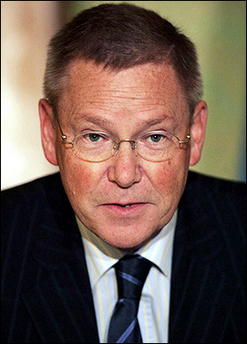 All eyes are fixed on Syria following Security Council Resolution 1636 calling on Damascus to fully cooperate with UN Prosecutor Detlev Mehlis’s investigation into the killing of former Lebanese prime minister Rafik Al-Hariri. But political powerbrokers in Lebanon are wasting no time preparing for the implications of this pressure on Lebanon’s future.
All eyes are fixed on Syria following Security Council Resolution 1636 calling on Damascus to fully cooperate with UN Prosecutor Detlev Mehlis’s investigation into the killing of former Lebanese prime minister Rafik Al-Hariri. But political powerbrokers in Lebanon are wasting no time preparing for the implications of this pressure on Lebanon’s future.
In Lebanon, the presidential race is back in the news, as well as speculations about the location and format of an international or local trial of suspects in the crime. The question of the presidency took on an unexpected twist as news circulated of a possible meeting between embattled President Emile Lahoud and primary candidate for the post Michael Aoun.
A meeting that did take place between high-profile Christian leaders former president Amin Gemayel and freed Lebanese Forces head Samir Geagea to discuss the presidency file had considered the possibility of a national conference to form a consensus on the issue. Aoun has not ruled out any negotiations between him and other factions on this file, but he seemed less keen on tackling the subject at this point in time, and he told the BBC he will not vote for any other candidate if other parliamentary blocs don’t support his nomination.
A source close to Aoun told Al-Ahram Weekly the bid for presidency is unlikely to turn into a fully-fledged race before the end of the UN’s investigative commission mandate on 15 December.
"Aoun has not changed his position about the presidency," said the source, who did not want to be identified. "But because he is against the tackling of this subject in the media and prefers a constitutional exit for it, I don’t think any major move can take place before we have clear evidence and conclusions about the killing of Al-Hariri."
The influential Council of Maronite Bishops headed by Cardinal Nasrallah Sfeir has also repeated its call for dealing with the presidential file with extra caution and leaving the last word for Lahoud himself, who has repeatedly affirmed his intent to remain in his post until the end of his extended term in 2007.
The flurry of meetings and political declarations among different parties comes in the wake of the release of the second semi-annual report into the implementation of UN Resolution 1559 calling on the withdrawal of Syrian troops from Lebanon and the disarming of all Lebanese and non-Lebanese militias.
Critics of the follow-up report prepared by UN Envoy Terj Roed-Larsen point out its contradictory claims of emphasising the sovereignty, independence and territorial integrity of Lebanon while at the same time appearing to dictate how the Lebanese government exercise this sovereignty. The report urges the deployment of the Lebanese army forces in south Lebanon while pushing for the disarmament of Hizbullah.
Al-Ahram Centre for Political and Strategic Studies Deputy Director Mohamed El-Sayed Said says the language of the report is unprofessional and largely inspired by the language used in the US Congress when dealing with Syria. "This report expands on the content of Resolution 1559, which practically puts Lebanon under a form of trusteeship in contradiction with the UN charter," he said.
Said says the call for delineating the borders between the two countries, which should be a matter for both countries to solve between them, is being actively and unprofessionally pursued by Larsen in his report.
Reactions to the report in Lebanon were mixed, but most were less positive than reactions to the Mehlis report, with Hizbullah leader Hassan Nasrallah accusing it of being highly politicised and biased.
Resolution 1636 also added scepticism among groups allied with Syria that the international drive to uncover the truth about the assassination of Al-Hariri is increasingly overshadowed by the US campaign to contain and weaken the Syrian regime.
The resolution gives the commission sweeping powers in interrogating Syrian officials similar to those granted to it on Lebanese territory. In the case of Syria, however, there is no reference to working in tandem with the Syrian judicial authorities or in accordance with its laws and regulations. The commission has already requested to interview — in private — several top Syrian officials, rumoured to include Syrian President Bashar Al-Assad’s brother Maher and brother-in- law Assef Shawkat. With the Syrian regime under Al-Assad facing its greatest crisis to date, it remains to be seen whether further pressure on it will ultimately pave the way for yet another change in the leadership of Lebanon and a reshuffle of positions of power among its different factions.



